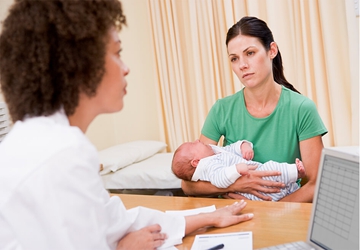Meta Description
“Have you recently given birth and are feeling sad, nervous, or depressed despite the joyous occasion? That is very typical. Continue reading to learn more about postpartum depression.”
In some instances, new mothers may feel gloomy or discouraged in the weeks following birth, making it challenging to accomplish ordinary daily duties and infant care. If left untreated, postpartum depression can worsen and harm the mother, baby, and family. Fortunately, there are several solutions.

What Causes Postpartum Depression?
According to most doctors, the fast reduction in hormone levels after birth is identical to the fluctuation that causes mood swings throughout your menstrual period. When combined with other lifestyle and psychological variables, new mothers are more vulnerable to depression. If a woman has a previous history of depression or has extra stress after delivery, such as an absence of support, sickness, relocation, job loss, or the death of a loved one, her risk may be increased.
What Are The Symptoms Of Postpartum Depression?
1. Crying over minor triggers
2. Mood swings or irritability
3. Feeling unattached to your baby
4. Insomnia, even though you’re exhausted
5. Brain fog
The Common Types Of Treatment For Postpartum Depression

Therapy. During treatment, you talk to a psychotherapist, psychologist, or counselor to discover techniques to modify how depression influences how you think, feel, and act.
Medicine. There are several medications available to treat postpartum depression. They must all be recommended by your doctor or nurse. Antidepressants are the most prevalent category.
Antidepressants can help ease depressive symptoms, and some can be used during nursing. It may take many weeks for antidepressants to begin functioning.
Electroconvulsive treatment (ECT). In severe circumstances, this can be used to address postpartum depression.
These remedies can be used separately or in combination. Discuss the advantages and hazards of taking antidepressant medication while pregnant or nursing with your doctor or nurse.
Finding Emotional Support Is Crucial
Some women are reluctant to share their deep feelings with others, yet seeking out loved ones, particularly a husband, maybe one of the most effective ways to begin recovering. Depression can be especially difficult for a partner with more domestic and childcare obligations. Open up to your spouse and inform them what you require, whether you believe it is counseling, medicine for depression, a support group, more assistance, or simply some alone time.
Depression may strike any woman during (or after) her pregnancy, and it has nothing to do with your capacity to be a good mother. If you suspect you are suffering from postpartum depression, you must get treatment for your baby's sake and for your own.
